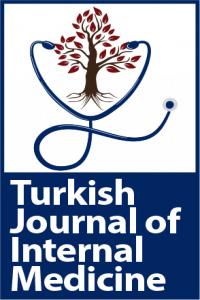
Turkish Journal of Internal Medicine
Yazarlar: ["Ahmet Münir YILMAZ", "Halil İbrahim ÇIKRIKLAR", "Vahide Aslıhan DURAK", "Burak KURTOĞLU", "Serhat ATMACA", "Suna ERAYBAR", "Feyzullah Faruk SEÇKİN Bu kişi benim", "Hakan ÇELEBİ", "Erol ARMAGAN"]
Konular:-
DOI:10.46310/tjim.1146947
Anahtar Kelimeler:Palliative Care,Emergency Department,Terminal Stage
Özet: Background This study aimed to analyze patients who apply to emergency services and need palliative care regarding appropriate patient care and effective use of health institutions. Materials and Methods The study was conducted prospectively on patients who applied to the emergency services of Bursa Uludag University Health Application and Research Center, Health Sciences University Bursa Yüksek Ihtisas Training and Research Hospital and Bursa City Hospital between 15.08.2021 and 15.02.2022 and needed palliative care. Results A total of 261 patients, 143 male (54.8%) and 118 female (45.2%), were included in the study. It was determined that 50 (19.1%) of these patients had previously received palliative care services. It was determined that the patients included in the study applied to the emergency services 7.52±6.77 times in the last year. The three most common diseases diagnosed in patients admitted to the emergency department were pneumonia (24.5%), urinary system infection (7.7%), and cerebrovascular disease (5.4%). Of the patients, 39.84% were referred/hospitalized, 25.28% were referred/hospitalized to intensive care units, 2.68% refused treatment, 2.68% died, and 29.5% have been discharged. Conclusion As a result, it is understood that most of the patients in need of palliative care do not receive this service, and patients who can be treated in palliative care units are treated in clinics and intensive care units.